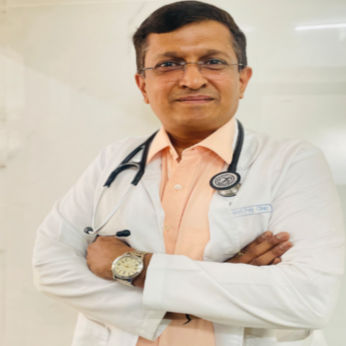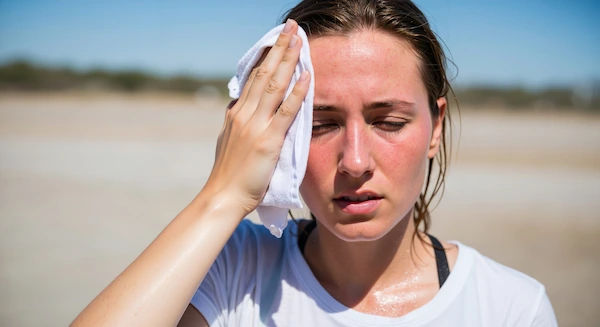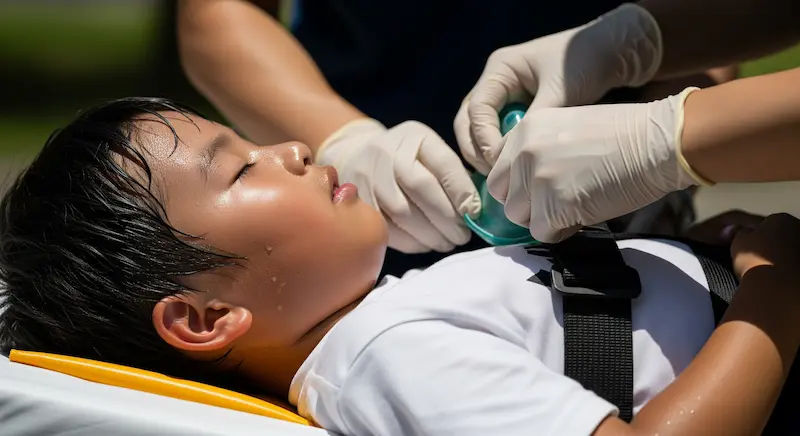Hyperthermia: Signs, Prevention, and Staying Safe
Learn about hyperthermia, its warning signs, risk factors, and prevention strategies. Discover how to differentiate heat exhaustion from heat stroke and stay safe during extreme heat.

.webp?tr=q-80,f-webp,w-350,dpr-2,c-at_max 700w)
Introduction
As temperatures climb, so does the risk of a serious heat-related illness known as hyperthermia. Far more severe than simply feeling a bit too warm on a summer day, hyperthermia occurs when your body absorbs or produces more heat than it can release, causing your core temperature to rise to dangerous levels. It's a medical emergency that demands immediate attention. This guide will equip you with the essential knowledge to recognise the critical warning signs of hyperthermia, understand the different stages of heat illness, and implement effective strategies to prevent it.
Understanding Hyperthermia: More Than Just Heat
Hyperthermia is the general name for a spectrum of conditions that occur when the body's thermoregulatory system is overwhelmed. Unlike a fever (pyrexia), which is a controlled increase in body temperature set by the hypothalamus in response to an infection, hyperthermia is an uncontrolled rise in body temperature that exceeds the body's ability to cool itself. This failure can lead to severe damage to the brain and other vital organs.
Consult a General Practitioner for Personalised Advice
The Body's Natural Cooling System
Your body is remarkably adept at maintaining a core temperature around 98.6°F (37°C). It manages this balance through:
- Sweating: The primary cooling mechanism. As sweat evaporates from your skin, it removes heat.
- Radiation: The release of heat from your body into the cooler air around it.
- Convection: The movement of air (e.g., a breeze) carrying heat away from your skin.
- When the environmental heat and humidity are too high, these systems fail. High humidity, in particular, impedes sweat evaporation, rendering your main cooling mechanism ineffective.
Key Differences: Heat Exhaustion vs. Heat Stroke
It's crucial to distinguish between the stages of hyperthermia. Heat exhaustion is a severe precursor, while heat stroke is a full-blown medical emergency.
| Feature | Heat Exhaustion | Heat Stroke |
| :--- | :--- | :--- |
| Core Temperature | Elevated (101°F - 104°F / 38.3°C - 40°C) | Critically high (104°F+ / 40°C+) |
| Mental State | Dizziness, headache, irritability, confusion | Profound confusion, disorientation, agitation, seizures, loss of consciousness |
| Sweating | Heavy sweating | Skin is often hot and DRY to the touch (though may be moist from earlier exertion) |
| Key Action | Cool the person immediately | This is a 911 emergency. Cool first, then call for help. |
Recognising the Signs and Symptoms of Hyperthermia
Early recognition can prevent a manageable situation from becoming life-threatening. Symptoms typically progress along a spectrum.
Early Warning Signs (Heat Stress)
These are your body's first signals that it's struggling with the heat.
- Heavy sweating
- Thirst and a dry mouth
- Muscle cramps or weakness
- Fatigue and reduced energy levels
- Flushed, red skin
Signs of Heat Exhaustion
If early signs are ignored, symptoms will worsen into heat exhaustion.
- Cool, moist, pale, or flushed skin (despite the heat)
- Intense headache and dizziness
- Nausea or vomiting
- Rapid, weak pulse
- Fainting or feeling faint
- Dark-colored urine (a sign of dehydration)
Critical Signs of Heat Stroke (A Medical Emergency)
Heat stroke is a catastrophic failure of the body's temperature control. Call 911 immediately if you observe these signs:
- * Extremely high body temperature (104°F / 40°C or higher)
- * Altered mental state: Confusion, agitation, slurred speech, irritability, delirium, seizures, and coma.
- * Cessation of sweating: The skin becomes hot, red, and dry. (Note: In exertional heat stroke, skin may still be moist.)
- * Rapid, strong pulse
- * Rapid, shallow breathing
- * Throbbing headache
Who is Most at Risk? Identifying Vulnerable Populations
While anyone can develop hyperthermia, certain groups are at a significantly higher risk and require extra vigilance.
- Infants and Young Children: Their bodies are less efficient at regulating temperature, and they are entirely dependent on caregivers for hydration and a cool environment.
- Older Adults (65+): The body's ability to sweat and circulate blood decreases with age. Underlying health conditions and certain medications can also increase vulnerability.
- People with Chronic Illnesses: Those with heart, lung, or kidney disease, high blood pressure, diabetes, or obesity are less able to cope with heat stress.
- Outdoor Workers and Athletes: Individuals engaged in intense physical activity in hot environments are prime candidates for exertional hyperthermia.
- Certain Medications: Diuretics, antihistamines, beta-blockers, and some antidepressants can impair the body's ability to stay hydrated and respond to heat.
Top Strategies for Preventing Hyperthermia
Prevention is always better than a cure. By adopting these proactive measures, you can significantly reduce your risk of heat-related illness.
Hydration: Your First Line of Defense
Proper fluid intake is the cornerstone of preventing heat stroke.
- Drink Plenty of Fluids: Don't wait until you're thirsty. By the time thirst kicks in, you're already dehydrated.
- Water is Best: For most activities, water is sufficient for maintaining hydration in hot weather.
- Consider Electrolyte Drinks: For prolonged, intense exercise lasting more than an hour, a sports drink can help replace salts and minerals lost through sweat.
- Monitor Your Output: Check the colour of your urine. Pale yellow means you're well-hydrated; dark yellow or amber indicates dehydration.
Acclimatisation: Letting Your Body Adapt
If you're not used to hot weather, your body needs time to adapt through a process called acclimatisation.
- Start Slow: Gradually increase the time you spend working or exercising in the heat over 1-2 weeks.
- Take Breaks: Schedule frequent breaks in a cool or shaded area to allow your body to recover.
- Listen to Your Body: Pushing through extreme fatigue or dizziness is dangerous.
Environmental and Behavioural Modifications
Smart choices about timing and clothing can make a huge difference.
- Time Your Activities: Schedule strenuous activities for the cooler parts of the day, such as early morning or late evening.
- Dress for the Heat: Wear lightweight, light-colored, and loose-fitting clothing. A wide-brimmed hat and sunglasses are also excellent for avoiding heat exhaustion.
- Seek Shade and AC: Whenever possible, stay in air-conditioned spaces. If you don't have AC at home, consider visiting public places like shopping malls or libraries during the hottest part of the day.
- Never Leave Anyone in a Parked Car: The temperature inside a car can become lethal in minutes, even with the windows cracked. This is a leading cause of heat-related deaths in children.
Conclusion: Stay Cool, Stay Hydrated, Stay Informed
Hyperthermia is a formidable opponent in hot weather, but it is almost entirely preventable. By understanding the clear warning signs from the heavy sweating of heat exhaustion to the critical confusion of heat stroke, you empower yourself to take action. Prioritising hydration, respecting the heat by acclimatising and timing your activities, and knowing how to respond in an emergency are the pillars of safety. Share this information, stay vigilant, and make smart choices to enjoy the summer months without putting your health at risk.
Consult a General Practitioner for Personalised Advice
Consult a General Practitioner for Personalised Advice

Dr. Mainak Baksi
General Practitioner
13 Years • MBBS , MD (MPH)
Howrah
Mainak Baksi Clinic, Howrah
(50+ Patients)

Dr. Rajib Ghose
General Physician/ Internal Medicine Specialist
25 Years • MBBS
East Midnapore
VIVEKANANDA SEBA SADAN, East Midnapore
Dr. Srilekhya
Internal Medicine Specialist Diabetologist
10 Years • MBBS, MD (GENERAL MEDICINE)
Bengaluru
Apollo Medical Center, Marathahalli, Bengaluru

Dr. Debdatta Pati
Psychiatrist
18 Years • MBBS, DPM, MD (PSYCHIATRY)
Kolkata
MCR SUPER SPECIALITY POLY CLINIC & PATHOLOGY, Kolkata

Dr. Rajesh R
General Practitioner
24 Years • MBBS
Bengaluru
Maruti Polyclinic and dental care, Bengaluru
Consult a General Practitioner for Personalised Advice

Dr. Mainak Baksi
General Practitioner
13 Years • MBBS , MD (MPH)
Howrah
Mainak Baksi Clinic, Howrah
(50+ Patients)

Dr. Rajib Ghose
General Physician/ Internal Medicine Specialist
25 Years • MBBS
East Midnapore
VIVEKANANDA SEBA SADAN, East Midnapore
Dr. Srilekhya
Internal Medicine Specialist Diabetologist
10 Years • MBBS, MD (GENERAL MEDICINE)
Bengaluru
Apollo Medical Center, Marathahalli, Bengaluru

Dr. Debdatta Pati
Psychiatrist
18 Years • MBBS, DPM, MD (PSYCHIATRY)
Kolkata
MCR SUPER SPECIALITY POLY CLINIC & PATHOLOGY, Kolkata

Dr. Rajesh R
General Practitioner
24 Years • MBBS
Bengaluru
Maruti Polyclinic and dental care, Bengaluru



